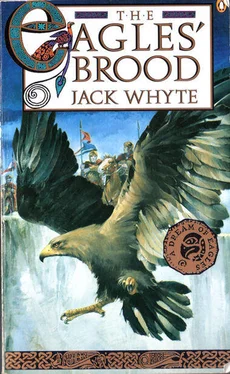"Were they all killed?" My voice was strained.
"Every last one of them. Those bowmen of your uncle's are wild men. No prisoners."
"What about the women in the camp?" Uther's question surprised me. I had completely forgotten about the women.
"What about them? We gave them food and let them go back to their homes."
"What about the camp?" To me, this was far more important than women.
"We destroyed it completely. Toppled the walls. They weren't high like ours—no more than stone fences. We scattered the stones. No one will use it as a camp again. And that was it. Except for one more thing, your father's idea, Caius. We piled the Saxon dead in one great pile, making sure they still wore their helmets and held their weapons. In days to come, any who find that pile of bleaching bones will know that these were Saxons and that they died in battle against a force far mightier than they."
"How many were there, Titus?" Uther asked. "Did you count?"
"Aye, a score more than three hundred. We had to assume that another large party had come in the night before, after the group we had watched arriving."
Uther was impressed. "And you left three hundred dead men piled in one heap?"
"A mountain of dead men, Uther Pendragon. That place will stench for the coming five years. But it will show any who look that there is no place for living Saxons in this land."
I sat there, staring into the fire and trying to imagine a pile of three hundred dead men. How many bones would that make?
Change was afoot in our land in those years, and in the eyes of the leaders of our Colony, it was centred upon two increasingly urgent needs, food and weaponry. That first punitive expedition, coupled with one more, almost simultaneous event, marked the beginning of a new phase in the life of Camulod just as surely as had the other key events referred to in the chronicles of Caius Britannicus and Publius Varrus: the wedding of Varrus and Luceiia, which started the whole thing, the decision to fortify the hill behind the villa, the first meeting with King Ullic Pendragon, and the decision to mount our troops.
The other crucial event passed largely unnoticed by the common people of Britain. Only the Council of Bishops and the few remaining centres of government knew of it. A delegation of bishops, acting as messengers of the Church, had been dispatched early in the year in one of the last available fortified galleys to implore the Emperor Honorius to intercede on the Church's behalf and send some regular troops to Britain to serve as a rallying point for the island's defensive forces. The delegation returned the following spring, just about the time of our raid on the Saxon settlement, with the word of Honorius: Britain should arrange its own defences and not look to the Imperial Armies for help.
That message combined with the destruction of the Saxon settlement — Picus's Raid, as it came to be known— forced the councillors of Camulod to recognize that they could no longer maintain a policy of insularity in matters of defence. We had discovered the existence of the new Saxon base almost by accident and had dispatched an expedition to deal with a band of about one hundred and fifty hostiles. They had encountered a force of more than three hundred and had been almost too late to thwart the enemy presence on our threshold.
The lesson was obvious: in order to prevent the emergence of any similar threat so close to us, the colonists of " Camulod would have to extend their patrol activities beyond the Colony's present perimeter. That meant an immense increase in the territory to be covered, for if Camulod was the centre of a circle, every mile pushed outward vastly increased the area contained within the protective circle. It was a grim predicament, but one that had to be accommodated; there was no other option. So the name of Camulod echoed through the land, as towns and villages that had never heard of the Colony were visited by patrols of disciplined troops. In this way the people learned that they were no longer alone and defenceless. They were warned to keep watch, and told how to find Camulod if they were in grave need of armed help.
One of the first results of this increase in people's awareness of us was a dramatic influx of would-be colonists, most of whom were totally lacking in the qualifications we demanded for admission to the Colony. They came in hundreds, seeking shelter, and in their hundreds we had to turn them away, not from callousness, but from necessity. Since we had started our Colony, we had developed an economy that centred upon food supply. We could eat only what we could produce and we were faced immediately with the impossibility of feeding everyone who came to us. Philanthropy and survival were not compatible for us. We threw up a cordon of guard posts around our lands for the sole purpose of turning away people whom we could not use. It was a terrible responsibility to place upon the men who staffed the posts, for it endowed them, in effect, with the power of life and death over everyone seeking entry to Camulod. I fear there were many who abused it, too: any woman will give her body in return for her life, and rare is the common soldier who can resist the sexual wiles of determined and desperate women, especially young, ripe women. We began to notice large numbers of nubile young women appearing in the Colony very soon after we threw up our cordon, and we had to take firm disciplinary steps to stop the flood, or at least slow it to a trickle.
The young men who came our way were all judged on their suitability as soldiers, for our increased commitments placed a greater strain on our military resources than on any other. My father was inexorable in his demands regarding these. Only the strongest were accepted right from the start, for he presumed, and was quickly proved correct, that we would have ample choice. The foot-soldier came back into his own very quickly in the new Camulod, for we soon ran out of horses for our new recruits. Within a year of the beginnings of this new policy, sub-garrisons had been established in half a dozen outlying camps at various distances from Camulod itself. These camps, as had the Roman camps four hundred years before, began to attract their own groups of colonists dependent on the safety and the promise of life and strength the camps afforded them. Consequently, new fields were broken and sowed with new crops, and we were glad of the surplus supply. There were also many artisans who came to our gates carrying their tools and the secrets of their trades, and none of these were ever turned away. They had a demonstrable value and were happy to work for the common welfare in return for a secure home.
To my mind, however, the most significant change effected by Picus's Raid was in the attitude of Ullic's people to our ways. The action had been their first real taste of the concerted power of their mighty new longbows used in conjunction with disciplined infantry and cavalry, and they wanted more. But the fifty-four bowmen that Ullic had been able to provide for that expedition were the only ones he had, and any increase in their numbers depended upon the availability of suitable wood for new bows. The making of the great bows was handled by the ageing master bowyer Cymric, who had created the first of them, and by his two sons, and each bow was a unique work of art. The importance of the weapon, and of the tree that was its source, rapidly became the dominant force in Ullic's whole kingdom. As his warriors learned its power, there was no need to tell them not to speak the name of the yew tree to others. It became sacrosanct almost overnight, from the day the first bow was completed, and this sacred inviolability contributed to the growth of the legend that sprang up around it.
As a tree, the yew fell within the religious provenance of the Druids, and within a short space of time every Druid who walked the land did so with the assistance of a seven- foot staff. Had anyone been curious enough to look, he might have noticed that all of these staves were remarkable in their similarity: all were of a length and thickness, and all were of yew. But no one did notice, and the Druids roamed the land, cutting their yew staves wherever they could find them, while in the hidden paths among the woods and hills, coverts of seedling yews grew untended, save that each would receive a passing Druid's glance from time to time.
Читать дальше









